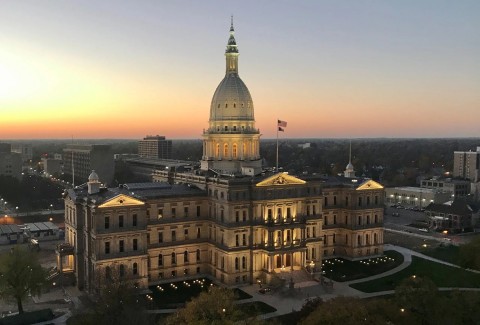Michigan lawmakers recently dropped a bill that feels straight out of a dystopian playbook. If it ever became law, it would make distributing pornographic material online a serious crime one carrying punishments so harsh, they’re almost unbelievable at first glance. We’re talking up to twenty years in prison, fines reaching a hundred thousand dollars, and in some cases half a million in civil penalties for each violation. That’s not an exaggeration, that’s written into the proposal itself.
The definition of what counts as “pornographic” is so sweeping that it could apply to just about anything that even hints at sexuality. The bill frames it as material “intended to sexually arouse or gratify,” which is vague enough to cover everything from explicit adult videos to erotic short stories, steamy romance novels, adult magazines, manga, and even AI-generated art or text. What makes this even more unsettling is that it specifically calls out depictions of transgender people, as if an entire community is being deliberately pushed into the crosshairs.
If the proposal passed, internet service providers in Michigan would be forced to filter out or block prohibited material, comply with court orders to take down websites, and even cooperate with a new “internet enforcement division” made up of investigators and forensic specialists. It’s not hard to imagine the chaos that would follow overblocking, wrongful censorship, and everyday users suddenly finding entire swaths of the internet off limits.
Think about how much of our lives are online now. For creators, writers, performers, and educators who deal with sexuality in any form, the risks would be overwhelming. Would you post your work if you knew a prosecutor might decide it’s “pornographic” and throw twenty years at you? Would a platform host that content if there’s a chance it could cost them hundreds of thousands per violation? The chilling effect would reach far beyond porn. It would touch art, education, sexual health resources, and communities that rely on open conversations about identity and intimacy.
The bigger picture here isn’t just about Michigan. Sure, experts say this bill has a slim chance of becoming law because it runs head-on into constitutional free speech protections. But even so, the fact that it was introduced at all matters. It shows a willingness by lawmakers to push for laws that criminalize expression and reshape the internet into something narrower, harsher, and less free. And if one state is willing to try, others might follow with their own versions.
At the end of the day, adults should be trusted to make their own choices about what they watch, read, and create. Slapping massive prison sentences and crushing fines on the act of sharing sexual material online doesn’t protect anyone it just breeds fear and silence. For people living in Michigan, this proposal is more than just words on paper. It’s a signal that their freedoms can be debated, restricted, and even taken away under the guise of morality.
So while the bill may never see the governor’s desk, it’s a wake-up call. Freedom of expression isn’t something we can afford to ignore, because every time lawmakers take a swing at it, we inch closer to losing it. And once that door closes, reopening it is nearly impossible.













